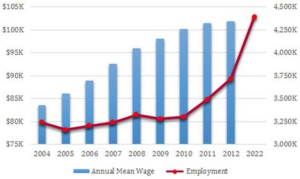Supply Chain Management MS

Supply Chain Mgmt
Join your peers in an upcoming cohort
In just 21 months, a MS degree in Supply Chain Management (MS-SCM) from Silberman College of Business will equip you with the technical and managerial skills to help improve the efficiency and effectiveness of business operations. The MS-SCM is currently offered on the Metropolitan campus only.
Why Supply Chain Management?
Effective management of their supply chain and operations is the key to value creation for many organizations, especially in today’s fast-paced and highly global business environment. Employers increasingly seek candidates with skills that will enable their organizations to better manage their supply chains and operations. The Supply Chain Management (SCM) profession has therefore witnessed significant job growth coupled with steadily increasing salaries. Whether you are starting off in your career or are looking to make a career transition into SCM, an advanced degree such as an MS in SCM will train you in critical aspects of SCM and will enable you to take advantage of the growing opportunities in the field. This program is STEM-certified.
The Right Place. The Right Time.
 According to the US Department of Labor’s recent report on Employment Projections (www.bls.gov/emp/), Supply Chain and Operations Management related jobs will grow by approximately 500,000 between 2012 and 2022.
According to the US Department of Labor’s recent report on Employment Projections (www.bls.gov/emp/), Supply Chain and Operations Management related jobs will grow by approximately 500,000 between 2012 and 2022.
Fortune.com reports that there will be a need for 1.4 million supply chain workers by 2018.
Career Opportunities
SCM is truly a global field that offers employment opportunities with a wide array of career options and advancement paths. We have successfully placed many of our international and domestic students into exciting SCM jobs and have helped them move forward in their career paths. Potential roles in the field include but are not limited to:
- Supply Chain Analyst/Consultant/Manager
- Operations Analyst/ Consultant/ Manager
- Logistics/Transportation Manager
- Purchasing Agent/Manager
- Procurement/ Sourcing Manager
- Product/ Brand Manager
- Production Planner/Manager
- Demand Planner/Manager
- Project Manager, Production Planner/Manager
- Inventory Manager, Warehouse Operations Manager
- Quality Assurance Analyst/ Manager
- Supply Chain/Software/IT Manager
Program Highlights
- Career Opportunities: There is an impressive track record in assisting students with internships, job placements, and promotions.
- Theory to Practice: Our faculty have strong academic credentials coupled with considerable experience in applying SCM concepts to practice.
- Personal Attention: Faculty and staff devote personal attention to addressing the needs of our students.
- Strategic Location: Perfectly located for you to be able to tap into professional networks and pursue career opportunities in and around the greater New York metropolitan area.
- State of the Art Facilities: “Smart” classrooms (pictured above) allow faculty to record and archive sessions for later review. Students also have access to finance labs using Bloomberg software for their research.
- Usable Knowledge and Skills: Using a variety of pedagogical techniques, the program will foster creative and analytical thinking.
Degree Requirements (30 credits)
Deadline to apply: June 1. Once your application is complete with all required admission documents, it will be reviewed and a decision will be made shortly after the application deadline.
The MS-SCM program is a cohort-based, 30-credit graduate study, comprised of ten 3-credit courses.
Foundation Courses (6 credits)
Core Courses (12 credits)
- DSCI6820 Logistics Management
- DSCI6830 Pricing and Demand Management
- DSCI6840 Global Sourcing, Procurement & Negotiations
- DSCI6850 Global Supply Chain Finance
Enrichment Courses (9 credits)
- DSCI6650 Project Management
- DSCI6750 Supply Chain Technologies
- DSCI6780 Sustainable and Lean Six-Sigma
Capstone Course (3 credits)
This capstone experience will require students to work on a project solicited and provided from real companies. The projects are related to specific knowledge and skills gained in the MS-SCM program. The project will entail the detailed description of the project by clearly identifying the issues and the objectives the company is facing and hopes to achieve. Students will need to work with the company’s executives and faculty advisor to collect the real data, analyze them, and provide a feasible solution. The primary objective of this experience is to give students the opportunity to demonstrate that they are able to apply knowledge and skills accumulated in the MS-SCM program to a specific supply chain problem. The capstone should be completed within the last module of the program prior to graduation. Students will advised by faculty in the completion of their project.
Tuition and Fees
See complete information on Graduate Tuition and Fees.
Each semester there are a limited number of Graduate Assistant Positions at Silberman College. These positions are compensated with tuition credits and a cash stipend.
Graduate Management Admission Test (GMAT)
Information about the GMAT is available from the Graduate Management Admissions Council. The GMAT Campus Code for the FDU MS in Supply Chain Management is J6X-HG-78. Please review the admission requirements to determine whether you need to take the GMAT.
Course Descriptions
-
DSCI6650 This course addresses the fundamental concepts of successful project management, with emphasis on project selection, planning and scheduling, team formation and governance, risk management, resource allocation, and progress monitoring. Students will develop the skills on how to effective plan, execute, and manage projects and project portfolios that meet their organization's business goals.
-
DSCI6750 This course examines IT applications that support a firm's operations in supply chain management, purchasing, logistics, and customer/supplier relations. It illustrates how the internet and information technologies are used to gain and sustain competitive advantage. Topics include ERP systems, SCM systems, CRM systems, e-procurement and e-logistics management systems, and other e-business applications.
-
DSCI6780 As organizations strive to provide high quality goods and services while achieving financial sustainability and growth, they are facing increasing pressures and government regulations in terms of environmental responsibilities. This course presents a holistic approach to operational excellence in supply chains, demonstrating the methodologies and practices that successfully combine Six-Sigma ideas with Lean and environmental sustainability.
-
DSCI6820 Stressing both analytical and strategic aspects, this course covers key logistics functions within the supply chain such as logistics network design, transportations planning and execution, distribution operations, order fulfillment, and reverse logistics. Emphasis is placed on being able to recognize and manage risk, and analyze various tradeoffs in the global marketplace.
-
DSCI6830 This course aims to give students an understanding of current topics and tools addressing the needs of an organization at the demand end of the supply chain. Rather than the traditional supply chain management approach of minimizing costs, this course considers the demand and value chain management approach of immunizing costs, this course considers the demand and value chain management focus on maximizing contributions and revenues. The strategic and tactical management of demand requires the use of appropriate pricing policies and the active balancing of supply and demand. Executive decisions, informed by best practices, are needed to best meet modern stakeholder expectations. Topics discussed include market segmentation and pricing strategy. Proven tools such as prior optimization and revenue management are introduced.
-
DSCI6840 This course teaches concepts and processes in supply and sourcing management, including analysis and selection of supply markets and suppliers, price and cost analysis, development of requirements, procurement of materials, services and equipment, buyer-supplier relationships, international contracts and negotiations, and negotiation simulation with emphasis on global competitiveness, legal issues, social responsibilities and ethics.
-
DSCI6850 This course demonstrates how successful management of the supply chain activities and processes tie to the financial systems, objectives and performance of the firm. Topics include financial statements analysis, supply chain valuation, and activity -based costing, capital investment analysis, management of working capital, international financial markets, global trade finance, and financial risk management.
-
DSCI7004 This capstone experience will require students to work in a project solicited and provided from real companies. The projects are related to specific knowledge and skills gained in the MSCM program, The project will entail the detailed description of the project by clearly identifying the issues and the objectives the company is facing and hopes to achieve. Students will need to work with the company's executives and faculty to collect the real data, analyze them, and provide a feasible solution. The primary objective of this experience is to give students the opportunity to demonstrate that they are able to apply knowledge and skills accumulated in the MSCM program by a specific supply chain problem. The capstone should be completed within the last module of the program prior to graduation. Students will be advised by faculty in completion of their project.
 Silberman College of Business is accredited by AACSB International.
Silberman College of Business is accredited by AACSB International.